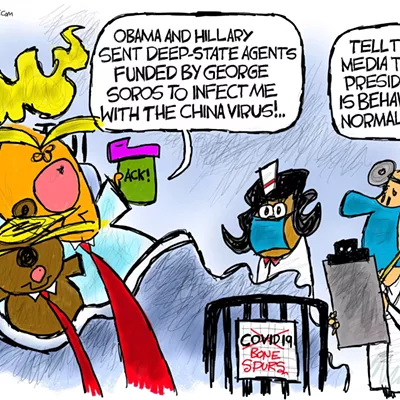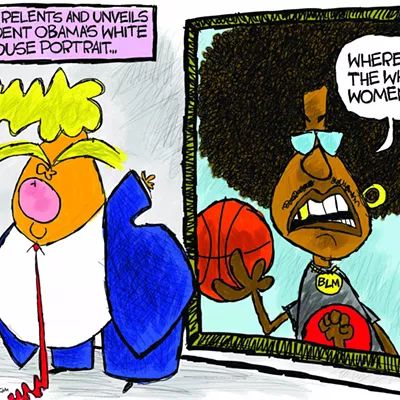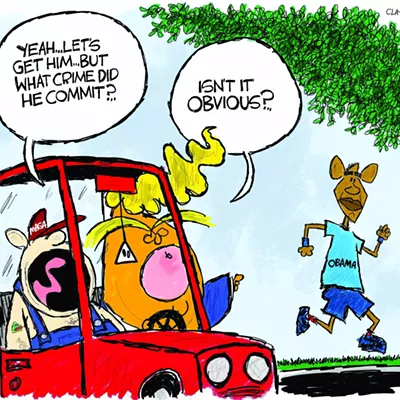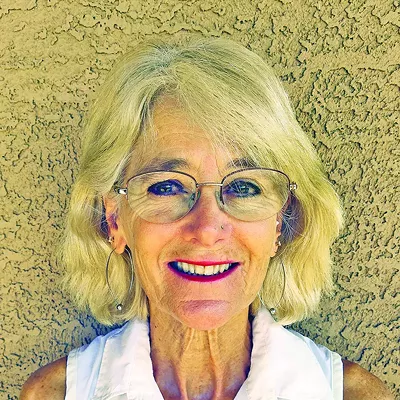Mencken probably would have been horrified by the crowd of journalists who attended Barack Obama's talk on Sunday, July 27, at UNITY '08, the largest conference for journalists of color in the United States.
Despite pre-emptive calls for restraint and professionalism, a huge crowd of black, Asian, Hispanic, Native American and white journalists gave Obama a standing and screaming ovation as he took the floor in his hometown of Chicago just after his tour of the Middle East and Europe.
The hall was less than half full but overflowing with support. When Obama took the stage at 11 a.m., wearing a tan suit with a red tie and an American flag pin, the crowd gave the candidate a loud, warm ovation.
Obama fielded a series of questions about Iraq, Afghanistan, the economy and religion. The journalists in the crowd groaned at some of the tougher questions and cheered, applauded and laughed at some of Obama's responses. During CNN's commercial break, when the audience was allowed to take pictures, the auditorium looked like the inside of a high-speed strobe light.
After the interview concluded, Obama stepped off the stage to shake hands with the media. The crowd rushed the stage as if the headlining band at a rock show had just played their first note.
As the weak barrier between Obama and the crowd wobbled and shifted under the weight, the Secret Service told the crowd to step back. Obama continued along the perimeter as the crowd followed him.
A growing number of Americans believe the media is favoring Obama's campaign, according to a Rasmussen Reports survey conducted this month. Nearly half of the people surveyed said they believed reporters are trying to help Obama get elected; 14 percent believe reporters will help McCain, and only 25 percent believe they will try to provide unbiased coverage.
The survey showed a big split along party lines: More than three out four Republicans believe the media is biased toward Obama, while just 27 percent of Democrats think that's the case. Half of the independent voters surveyed believe the media is pro-Obama, while just 21 percent believe the media are trying to be unbiased.
Republican John McCain is trying to capitalize on that perception; McCain's campaign recently unveiled an ad suggesting the mainstream media was "in love" with Obama.
But there's some evidence that the media are being harder on Obama than McCain. A survey by the Center for Media and Public Affairs showed that between June 8 and July 21, 72 percent of the on-air evaluations of Obama on ABC, NBC and CBS evening newscasts and Fox Special Report were negative, while just 28 percent were positive. By comparison, 57 percent of the comments about McCain were negative, while 43 percent were positive.
Nonetheless, the public continues to have trust issues with the media: 45 percent of the voters surveyed believe a reporter will hide information that is damaging to the candidate they want to win, while only 30 percent have faith that they won't, and 25 percent don't know what to think, according to the Rasmussen survey.
The Society of Professional Journalists code of ethics is the go-to guide for ethical standards in journalism. An ovation like the one Obama received breaks several aspects of the "Act Independently" section of the code, according to Fred Brown, the vice-chair of the Ethics Committee for the Society of Professional Journalists.
He says that being polite and applauding a speech of a prominent politician is acceptable, "but if it sounds more like a pep rally, I would say that's going overboard."
Journalists have a lot of critics, Brown says. And showing too much support for any one candidate reinforces the public perception that journalists are not as impartial as they claim.
"Being a journalist means making a certain amount of sacrifices," Brown said. "And a lot of that is not showing partisanship in any public setting."










